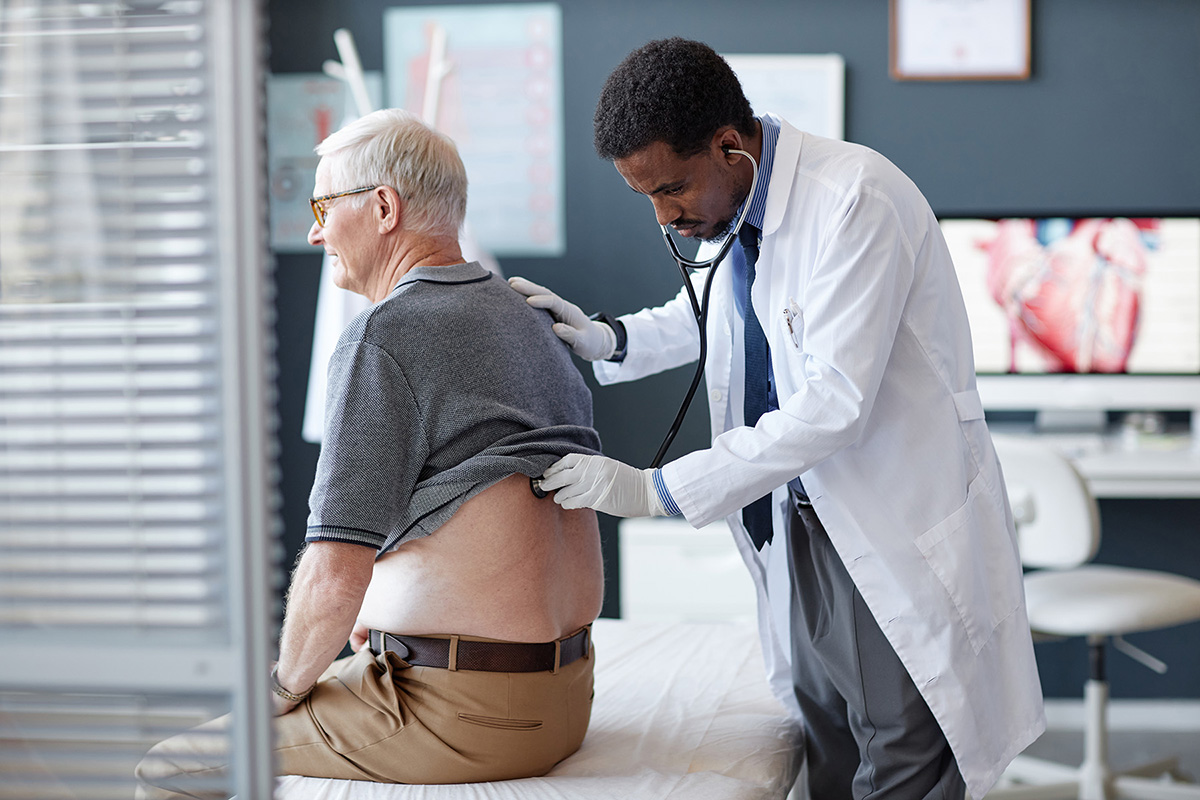Article by Gwen Jones, Department of Family Services
(Posted 2025 November)


November is Lung Cancer Awareness Month – a perfect time to learn about lung health, recognize warning signs of lung disease, and take steps to protect your lungs. Did you know that lung cancer is the leading cause of cancer deaths among both men and women in the United States?
Here in Fairfax County, the rate of lung cancer is lower than the national average (17.9 cases per 100,000 compared to 34.3 cases nationally, according to the National Cancer Institute). However, there is still cause for concern: 65.7% of lung cancer cases in Fairfax County are diagnosed in late stages, when treatment can be more difficult. This is close to the national rate of late-stage diagnoses (64.9%).
Protecting your lungs and recognizing symptoms early can help improve your chances of staying healthy. Here are some of the most common symptoms of lung disease and steps you can take to care for your lungs.
Recognizing Symptoms of Lung Disease
One challenge with lung cancer is that symptoms often don’t show up until the cancer is advanced. This is why it’s important to know what to watch for and to see a doctor right away if you notice any of these symptoms. According to the American Lung Association, signs of lung disease include:
- A persistent cough that lasts longer than eight weeks.
- Shortness of breath that doesn’t improve with rest or exercise.
- Chest tightness or pain.
- Coughing up mucus or phlegm for more than a month.
- Wheezing or noisy breathing.
- Coughing up blood.
If you’re experiencing any of these symptoms, schedule an appointment with your doctor as soon as possible.
How to Protect Your Lungs
Here are a few important steps to keep your lungs healthy:
Don’t Smoke (or Quit if You Do!)
Smoking is responsible for nearly 90% of lung cancers, according to the Centers for Disease Control and Prevention (CDC). If you don’t smoke, don’t start. If you do smoke, quitting is one of the best ways to improve your lung health.
- For help quitting, visit smokefree.gov or call 1-800-784-8669.
- Avoid secondhand smoke as well. People who don’t smoke but are exposed to secondhand smoke have a 20-30% higher risk of getting lung cancer.
Avoid Pollution
The air we breathe can affect our lungs both indoors and outdoors. Follow these tips to protect yourself from harmful air pollutants:
Outdoors:
- Avoid exercising when the air quality is poor. Check your local air conditions at AirNow.gov.
- Stay away from areas with heavy traffic or busy roads during outdoor activities.
- Don’t burn wood or trash, as these release harmful particles.
Indoors:
We spend about 90% of our time indoors, where air quality is often worse than outside. Many common household items can make indoor air unhealthy, such as cleaning supplies, household chemicals, mold, dust mites, pet dander, and radon gas.
Signs of poor indoor air quality (IAQ) include:
- A musty or unusual odor.
- Poor ventilation, like windows that don't open or rooms that are always stuffy.
- Allergy-like symptoms that improve when you leave your home.
To improve your indoor air:
- Keep your home well-ventilated. Open windows when possible to let fresh air circulate.
- Clean regularly to remove dust and allergens.
- Consider testing your home for radon, carbon monoxide, and other toxins.
Fairfax County Public Library offers tools to help you check your home’s air quality. Through their "Library of Things," you can borrow devices like an air quality monitor, carbon monoxide meter, and radon monitor. For details, visit research.fairfaxcounty.gov/lot/meters.
Stay Active and Eat Well
Regular exercise and a healthy diet not only benefit your lungs but also improve your overall health. Activities like walking or yoga can help strengthen your lungs, while fruits and vegetables provide important nutrients to keep them healthy.
Get Preventive Care
Make routine check-ups a priority and talk to your doctor about whether lung cancer screenings are right for you.
Who Should Get Screened for Lung Cancer?
Lung cancer screenings with a low-dose CT scan can detect cancer early, before symptoms appear. Early detection can make treatment more effective. However, screenings are only recommended for people at higher risk. Screenings are recommended for people who:
- Are 50-80 years old.
- Have a smoking history of 20 pack-years or more (e.g., smoking one pack a day for 20 years).
- Either still smoke or have quit smoking in the last 15 years.
If you meet these criteria, talk to your doctor about the benefits and risks of screening.
Take Charge of Your Lung Health
Lung Cancer Awareness Month is a great reminder to be proactive about your lung health. Whether it’s quitting smoking, improving indoor air quality, or recognizing symptoms early, small actions can have a big impact.
This article is part of the Golden Gazette monthly newsletter which covers a variety of topics and community news concerning older adults and caregivers in Fairfax County. Are you new to the Golden Gazette? Don’t miss out on future newsletters! Subscribe to get the electronic or free printed version mailed to you. Have a suggestion for a topic? Share it in an email or call 703-324-GOLD (4653).

